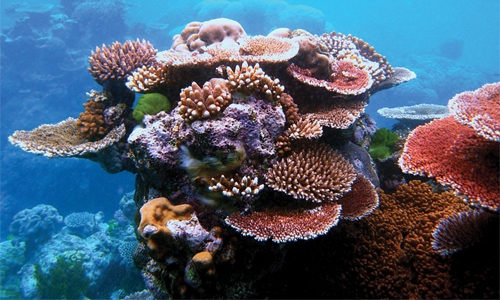Kingdom might witness worst coral die-off ever
Manama : Bahrain’s coral reefs could be hit by severe annual bleaching in coming decades, according to the latest climate model projections.
“The coral reefs in Bahrain will face a threat of severe annual bleaching brought about by climate change if current trends continue and the world fails to reduce greenhouse gas emissions”, researchers said.
According to the researchers, coral reefs all over the world could be impacted by this, starting 2043.
The study conducted by International researchers Ruben van Hooidonk, Jeffrey Maynard, Jerker Tamelander, Jamison Gove, Gabby Ahmadia, Laurie Raymundo, Gareth Williams, Scott F. Heron and Serge Planes and published in the Nature Scientific Reports found that reefs in Taiwan and around the Turks and Caicos archipelago would be the first to experience the severe annual bleaching.
“These predictions are a treasure trove for those who are fighting to protect one of the world’s most magnificent
and important ecosystems
from the ravages of climate change,” said Erik Solheim, head of United Nations Environment Programme (UNEP).
“They allow conservationists and governments to prioritise the protection of reefs that may still have time to get accustomed to our warming seas. The projections show we still have time to act before it’s too late,” he added.
According to the projections, reefs in Bahrain, Chile and Polynesia in French is the next to be hit after Taiwan.
“Increasingly frequent and severe coral bleaching is among the greatest threats posed by climate change to coral reefs. Global climate models (GCMs) project great spatial variation in the timing of annual severe bleaching (ASB) conditions; a point at which reefs are certain to change and recovery will be limited,” the report read.
Reef-building corals bleach when warmer than normal sea temperatures disrupt their mutualistic relationship with the algal symbionts, called zooxanthellae, that reside within their tissues.
Corals can either survive or die if temperature stress persists.
“Currently, we are in the middle of the longest global coral bleaching event on record. Unprecedented and prolonged ocean warming triggered a global coral bleaching event that started in 2014 and ran into 2017. The length of the event means corals in some parts of the world had no time to recover in 2014 or 2015 prior to experiencing bleaching the following year. A majority of coral reefs globally are projected to experience annual severe bleaching (ASB) by the mid-2050’s under the emissions scenario that best characterises current conditions,” researchers stated in the report.
Related Posts

